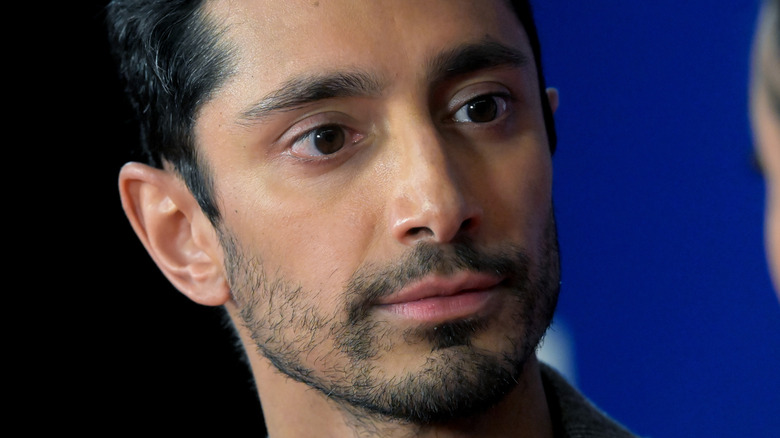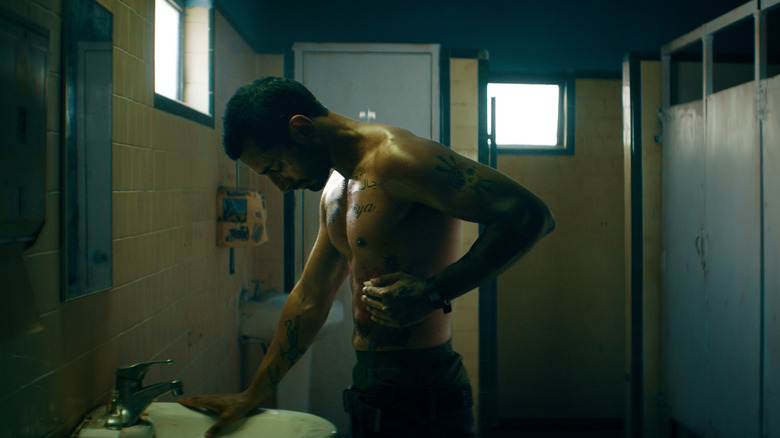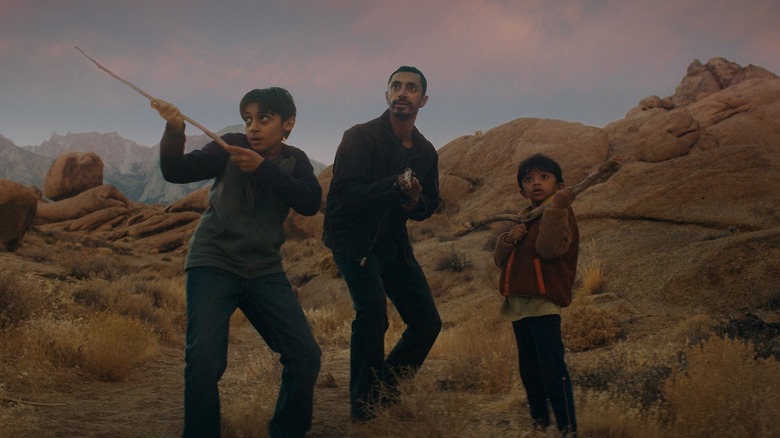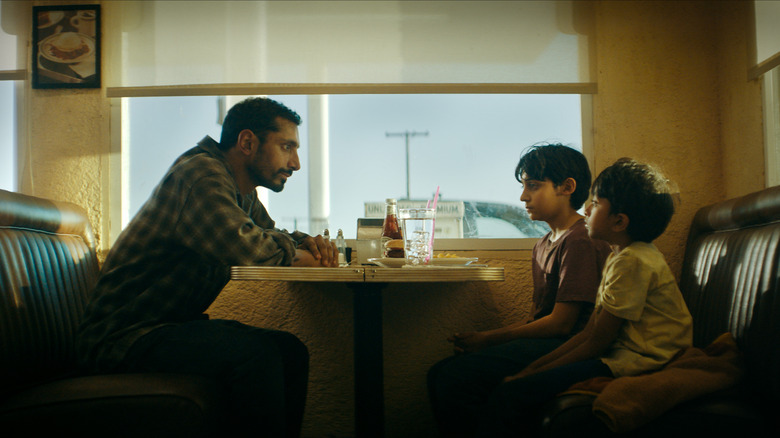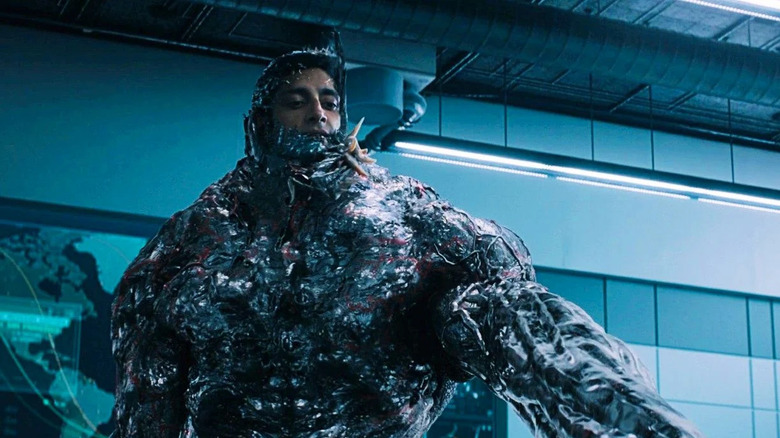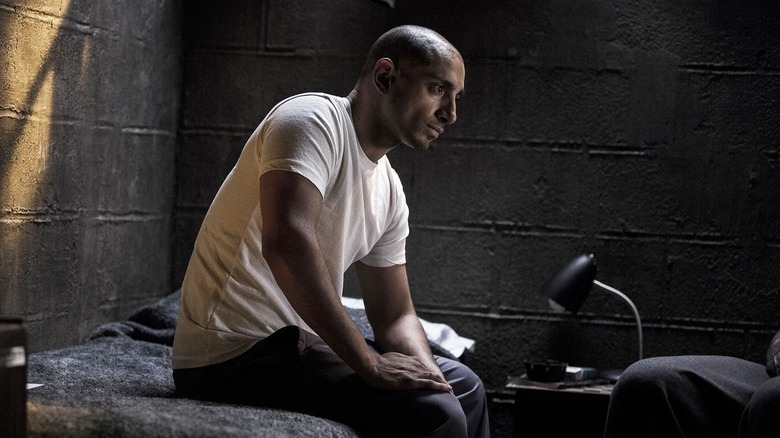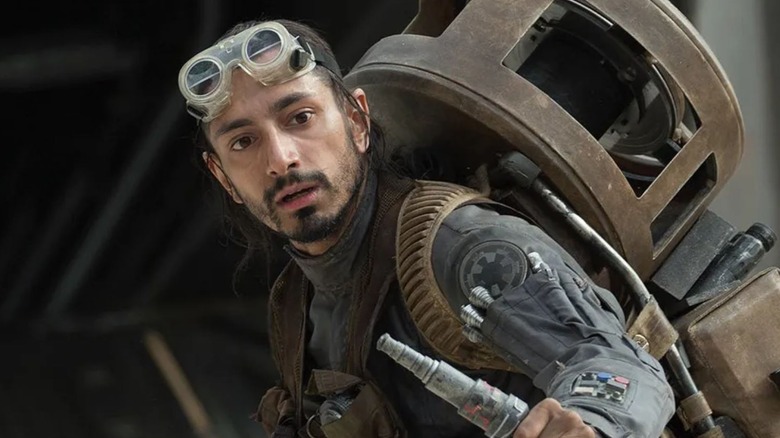Encounter Star Riz Ahmed On Playing An Ex-Marine On A Mission - Exclusive Interview
Oscar-nominated and Emmy-winning actor Riz Ahmed follows up his stunning performance in last year's "Sound of Metal" with an equally mesmerizing one in the new Amazon Original Movie, "Encounter." Ahmed plays Marine Corps veteran Malik Khan, who strives at all costs to protect his two sons, Jay (Lucian-River Chauhan) and Bobby (Aditya Geddada), from a covert alien invasion. Directed by Michael Pearce ("Beast"), "Encounter" throws several genres — sci-fi, psychological drama, chase thriller — into a blender and ends up being a movie that is both hard to categorize and difficult to predict.
That sums up the eclectic career of Ahmed himself. The British-Pakistani artist began as a rapper and DJ while still in his teens, making his film debut in 2006's "The Road to Guantanamo." Ahmed won acclaim for his roles in 2010's "Four Lions" and 2014's "Nightcrawler" before exploding into the public consciousness with the 2016 HBO limited series "The Night Of," in which he played a college student accused of murdering a woman he spent the night with.
Ahmed earned an Emmy for the show, making history as both the first Muslim and first South Asian to win the award for a lead role. That same year, he appeared in "Rogue One: A Star Wars Story" as Bodhi Rook, with the billion-dollar-grossing movie introducing him to an even wider audience. He showed up as the villainous Carlton Drake/Riot in another massive genre hit, 2018's "Venom," before becoming the first Muslim and Pakistani actor to land a Best Actor Oscar nomination for his work in 2019's "Sound of Metal," as a heavy metal drummer who suddenly loses his hearing.
With all that on his resume, Ahmed has established himself as one of the most compelling actors of his generation. As he tells Looper, the craft itself remains the same for him: "The scale at which you're working or how many audiences you might be reaching kind of changes, but on just a personal level, you're still there with the script, with the person opposite you, just trying to make it come to life."
How Riz Ahmed approached the character in Encounter
What was your way into this character of Malik? What did you respond to most when you first read the script?
I just thought I haven't really played anyone like this before. I didn't think I probably could, so I thought it'd be a good challenge — try and play a dad, try and play a soldier, do something more physical. I also just really wanted to work with Michael Pearce. I thought it was a beautiful film he made with "Beast." And again, with this script, he's trying to blend a character drama with a genre piece. That's a really tricky thing to do. A lot of people don't even attempt it, but he nailed it. So it was a combination of filmmaker and the role and just reading the script. It just kept me on the edge of my seat the whole way through.
You spoke to service members as part of your research. What did you learn from those guys and how did that help you dig into the character even more?
I learned a lot. I don't know how to summarize it really, but I learned that most people fighting a war aren't really fighting for a flag or an idea. They're fighting for the people to their left and right, they're fighting for this uniformed family they have, and often fighting for a sense of belonging and dignity within that.
That's not to excuse people's actions. I'm a pacifist really at heart if that's possible or realistic in this world we live in, but it did force me to have a bit more empathy for people who find themselves in those situations and understand people's journeys, and the amount of damage that there often is in people's lives, how scarred some people are, and how they're tempted by a sense of belonging and family to go and do these things that end up damaging them even more, frankly. So that was definitely eye-opening.
Ahmed went through training and coaching for the role
You also did physical and firearm training. How did that affect you as well?
I mean, it's not something that I've got a lot of experience in, but learning how to do it was... Learning how to do anything opens up different sides of you. And it helps unlock your connection to different characters, particularly like physical activities or learning new skills. Malik is a character who's handled a lot of firearms and been in good conflict situations, so it was important to kind of dig into that.
How did you get the accent down? Did you work with a coach?
Well, I work always with my coach, Gregory Berger-Sobeck. I also worked with an accent coach for the first time, Liz Himelstein. But honestly, a lot of it comes from recording interviews as well, from just speaking to people, recording them, listening to the recordings and allowing something to — I don't know. Like allowing yourself to absorb something. A certain rhythm or a certain energy. That's usually how that process works.
It's interesting. Michael Caine wrote a book about acting and he says, "Whatever you can do, don't play in other accents because it just takes up so much bandwidth." I think that's kind of right. It does take up a lot of bandwidth. But interestingly, if you do give it that time, it can also help unlock a lot of things. I think a lot of our character is in the way you connect with the world, the way you carry yourself in the world. That's about physicality. That's about vocalization. So it is kind of like, "Oh my God. I've got to spend so much time being conscious of this extra layer of thing. It gets in the way of the emotion." But then, when you get to a place where you're sitting in a certain pocket with it, then it does create a shape to hold all that feeling. And that shape is specific and different from yours if that makes sense.
What Ahmed found 'inspirational' about the movie
Is it true that you like to stay in character during a shoot?
I wouldn't say "stay in character" because a character is defined by their circumstances, right? So after "cut," my circumstances are different. I'm on a film set, so I'm not kind of going, "Oh my God. Enemies, get down. 12 o'clock." I just stay in the accent and that's just to help me not have to think about it too much.
You worked with two kids who are incredible in this film. What did you do to bond with them?
To be honest, we connected straight away because it's hard not to connect to those kids. They're just so sweet, so funny, so smart, and so talented. They just taught me so much about acting in a way. They just reminded me about how important it is to be open and present. Aditya would improvise almost everything. He didn't say a single line that was in the script. And River was always just preparing for scenes and always committing to his role with such — it was inspirational to be honest.
It was like a kind of reminder. It was like, "Hey. Remember this is what you do. This is what it's about." I was like, "Oh my God. Yeah. I got to up my game." So it was a joy. They're amazing actors. I really hope they go on to have big careers. And I think that they will if they want it. That's my hope. I think that they're just really, really special, talented young actors. I was lucky to work with them, honestly.
How Ahmed feels about working in different genres
You mentioned this being sort of a mix of genres. This has got elements of sci-fi, elements of a chase thriller, a psychological drama. You like the idea of going into a movie and mixing it up like that?
Yeah, I think it's kind of what keeps it interesting for me, keeps it interesting for audiences. I think there's just so much stuff out there, stuff that's interesting to do that makes us sit up basically. That isn't just more of the same or doesn't fit neatly into one box. I feel like I don't fit neatly into one box. Most people probably feel like they don't fit neatly into one box. So why should our stories?
You did the superhero genre with "Venom" a couple years ago. Is that a genre you would want to revisit in a different context as a superhero yourself?
I'm open to all of it, man. If the characters are interesting, the filmmakers are interesting. And I'm open to all of it. I think that's part of the fun of this is you don't know what's quite around the corner.
Did you grow up reading comics?
I didn't. I didn't really grow up reading comics. I grew up watching, like a lot of people I guess, animations in that kind of golden age of those French-Japanese co-productions. So you had cartoons like "Ulysses 31" or "Mysterious Cities of Gold" or "ThunderCats." You had a lot of those really interesting, imaginative cartoons on at that time. So I was big into those, but I didn't really read comic books. It's now so interesting to see how that's kind of dominating the box office and has for maybe the last decade or so. It's a world full of such possibilities. Because it is a work of make believe, I think it has helped kind of stretch our imaginations of what films can be and who can play what roles. All kinds of stuff has been thrown open. It's pretty cool.
Why 2016 was a pivotal year for him
Five years ago, you starred in "The Night Of" for HBO, won an historic Emmy for that [series], and also showed up in "Rogue One." Did things feel like they kicked up a notch for you that year?
Yeah, probably. I mean, the thing that changed is that people in America became aware of my work. And yeah, that was definitely a change. I started doing a couple of bigger films back to back. That was a change. But also it's that old saying, isn't it? The more things change, the more they stay the same. The kind of project you might be working on changes, how many people are aware of your work might change, but you still face the same creative blocks in your work. You still, I don't know, hopefully find the same satisfaction in your work.
It's like the scale at which you're working or how many audiences you might be reaching kind of changes, but on just a personal level, you're still there with the script, with the person opposite you, just trying to make it come to life. So it is kind of interesting — like, from the outside, how things change so much, but on the inside, things are just exactly the same. I keep a journal. Every film I do. Every week of filming, I'm like, "All right. What's going on right now? What am I learning? What am I struggling with? What do I need to remind myself?" I've been doing that for like 10, 15 years. I look back over it. I'm saying the same thing every week of shooting in my entire life. So it's quite funny when you realize that.
Ahmed names a favorite actor and film
Name an actor, past or present, living or dead, that you would like to work with or wish you could have worked with.
Irrfan Khan. I just think he was a unique and profound actor. And I think he bridged Hollywood and Bollywood in a really unique and unprecedented way.
Do you have a favorite film of all time?
Probably "Goodfellas." It's just such an enjoyable film. At the same time, it's such a subversive film. From a cinematic point of view, it's so bold and groundbreaking, so many of the editing techniques in there. The use of voiceover was so rule-breaking and game-changing. The way it plays with time. It's just one of those films that whenever it's on TV or whenever you catch it, you're just like, "Okay, we've got to watch it. Let's just turn the phone off. We got to just get through this one." I love that film. I just think it's an undeniable movie. You show it to anyone who hasn't seen that movie before, I don't think anyone will say, "Yeah. Okay. I'm not interested. Turn it off." Everyone's gripped by it. Everyone.
"Encounter" is now streaming on Amazon Prime Video.
